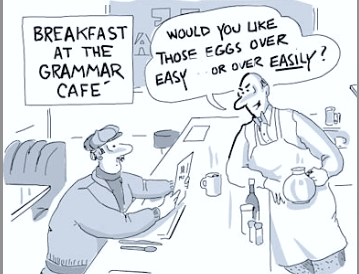Today’s Bizarro:
The expression needs an adverb, right? Easy is an adjective, right? So eggs over easy is wrong-wrong-wrong; it has to be eggs over easily.
Well easy is indeed an adjective, a lot of the time; but it’s also an adverb. And in any case over easy (as a postmodifier of eggs) is an idiom, one of many involving easy used as an adverb; idioms are as they are, even if (like, say, by and large) they violate otherwise general principles of English syntax.
Before I take up these points, two more cartoons on the same theme as the Bizarro above. First one from J. C. Duffy (here) that is quite close to the Bizarro:
On Duffy:
J.C. Duffy is an American cartoonist. He made the “Go Fish” comic strip from October 8 2002 to October 8 2007, and currently creates “The Fusco Brothers.” He also writes and draws cartoons that appear in The New Yorker and other magazines. (link)
A Fusco Brothers cartoon appeared on Language Log back in 2007 (here).
And then there’s a cartoon in the style of New Yorker cartoonist Leo Cullum:

I say “in the style of Leo Cullum” because I’m pretty sure that this is not his: either someone has recaptioned a diner cartoon of Cullum’s (which I haven’t yet found, but then Cullum was an incredibly prolific cartoonist) or else some has done a great job of mimicking Cullum’s drawing style. (This cartoon can be found on at least six sites, where it is much appreciated but not attributed.)
One more thing before I go on to syntax, namely what eggs over easy are. From Wikipedia:
A fried egg is a cooked dish commonly made using a fresh hen’s egg fried whole with minimal accompaniment. They are traditionally eaten for breakfast in English-speaking countries, but may be eaten at other times of the day.
“Sunny side up” — cooked only on one side; yolk is liquid; the egg white is set. This is often known simply as “eggs up”. Gently splashing the hot cooking oil or fat on the sunny side uncooked white, i.e., basting, may be done to thoroughly cook the white. Covering the frying pan with a lid during cooking (optionally adding a cover and half-teaspoon of water just before finishing) allows for a less “runny” egg, and is an alternative method to flipping for cooking an egg over easy (this is occasionally called “sunny side down”).
“Over easy” or “over light”, cooked on both sides; the yolk is a light runny and the egg white is fully cooked. “Over easy” fried eggs are also commonly referred to as dippy eggs or dip eggs by Marylanders, by Pennsylvania Dutch persons living in central Pennsylvania and those living around them, mainly due to the practice of dipping toast into the yolk while eating.
And from OED3 (Dec. 2004) for over easy adj.:
Etymology: Apparently < over adv. + easy adv. [note the “apparently”]
Cookery (orig. and chiefly U.S.). [which is why some explanation might be needed for readers of this blog]Of a fried egg: turned over when almost cooked and fried briefly on the reverse side. Also occas. of other fried foods. Cf. sunny side up at sunny adj. 5b(c), once over lightly at once adv., conj., adj., and n. Phrases 11.
Chiefly as postmodifier.[First cite:] 1930 Newark (Ohio) Advocate & Amer. Tribune 30 Aug. 4 Mikos, a restaurant owner, received an order for ‘two over easy’. He broke one egg into a pan and it was perfect. But the next egg, on being broken, yielded no yolk.
Notice that the OED suggests that the easy of over easy is indeed an adverb.
And in OED2 under easy adv. we find:
4. a. colloq. At a leisurely pace, comfortably, without much trouble; in a comfortable position (also transf. of a ship).
[first cite:] 1779 T. Forrest Voy. New Guinea 13 Which kept the vessel’s head to the sea, and made her lie easy.
Notice the usage is labeled as colloquial (though that label apparently dates from about a hundred years ago). But in any case, over easy is an idiom, like a number of other phrases with easy that the OED lists in section 4.a.:
to take it easy, to make oneself comfortable, to do no more than one must; also, to let one off easy, i.e. with a light penalty; to go easy (on or with), to use sparingly; to act cautiously, to proceed with caution; also absol. (cf. quot. 1885); easy does it, go carefully, take your time. [and rest easy, don’t worry]
and in successive sections:
b. colloq. As word of command. easy!: (move) gently! Also easy ahead!: (steam) at a moderate speed!; easy on: steady on! go easy! In Boating, easy all!: stop (rowing)!
c. stand easy: an order in military use allowing a greater freedom of posture than ‘stand at ease’.
So “correcting” over easy to over easily is like “correcting” play it as it lays to play it as it lies (here, with other examples). There’s a lot about idiomatic expressions that you just can’t mess with.


April 4, 2013 at 9:02 am |
Wilson Gray on Facebook:
April 4, 2013 at 9:07 am |
Robert Coren on Facebook:
The English major = grammar prescriptivist stereotype has been around for a long time.
April 6, 2013 at 9:18 am |
So if you break the yolk and cook them well, they’d be “eggs over hardly”? (I doubt it)